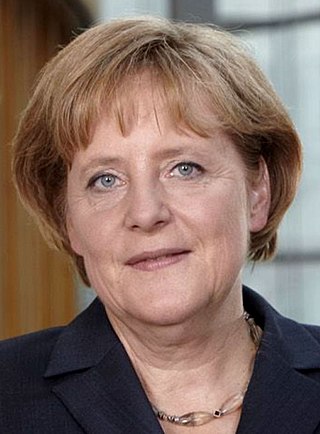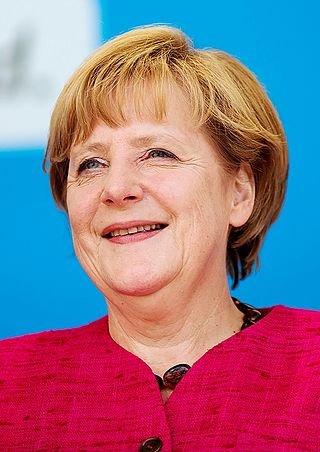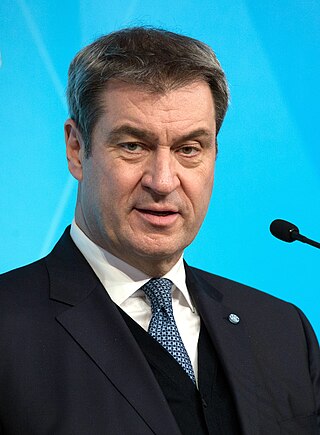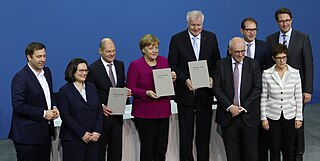
The Christian Social Union in Bavaria is a Christian democratic and conservative political party in Germany. Having a regionalist identity, the CSU operates only in Bavaria while its larger counterpart, the Christian Democratic Union (CDU), operates in the other fifteen states of Germany. It differs from the CDU by being somewhat more conservative in social matters, following Catholic social teaching. The CSU is considered the de facto successor of the Weimar-era Catholic Bavarian People's Party.

The Free Democratic Party is a liberal political party in Germany.

Germany is a democratic and federal parliamentary republic, where federal legislative power is vested in the Bundestag and the Bundesrat.

The Christian Democratic Union of Germany is a Christian democratic and conservative political party in Germany. It is the major catch-all party of the centre-right in German politics.

Federal elections were held in Germany on 22 September 2002 to elect the members of the 15th Bundestag. Incumbent Chancellor Gerhard Schröder's centre-left "red-green" governing coalition retained a narrow majority, and the Social Democratic Party (SPD) retained their status as the largest party in the Bundestag by three seats.

Federal elections were held in West Germany on 6 March 1983 to elect the members of the 10th Bundestag. The CDU/CSU alliance led by Helmut Kohl remained the largest faction in parliament, with Kohl remaining Chancellor.

Federal elections were held in Germany on 18 September 2005 to elect the members of the 16th Bundestag. The snap election was called after the government's defeat in the North Rhine-Westphalia state election, which caused them to intentionally lose a motion of confidence to trigger an early federal election. The outgoing government was a coalition of the centre-left Social Democratic Party of Germany (SPD) and Alliance 90/The Greens, led by federal Chancellor Gerhard Schröder. The election was originally intended for the autumn of 2006.

Federal elections were held in Germany on 27 September 2009 to elect the members of the 17th Bundestag.

The First Merkel cabinet was the Government of the Federal Republic of Germany from 22 November 2005 to 27 October 2009 throughout the 16th legislative session of the Bundestag. Led by Christian Democrat Angela Merkel, the first female Chancellor in German history, the cabinet was supported by a grand coalition between the Christian Democratic Union (CDU), Christian Social Union of Bavaria (CSU) and the Social Democratic Party (SPD).
CDU/CSU, unofficially the Union parties or the Union, is a centre-right Christian democratic political alliance of two political parties in Germany: the Christian Democratic Union of Germany (CDU) and the Christian Social Union in Bavaria (CSU).

Federal elections were held on 22 September to elect the members of the 18th Bundestag of Germany. At stake were all 598 seats to the Bundestag, plus 33 overhang seats determined thereafter. The Christian Democratic Union of Germany/Christian Social Union of Bavaria (CDU/CSU) of incumbent chancellor Angela Merkel won their best result since 1990 with nearly 42% of the vote and nearly 50% of the seats, just five short for an overall majority. The Free Democratic Party (FDP) failed to meet the 5% vote electoral threshold in what was their worst showing ever in a federal election, denying them seats in the Bundestag for the first time in their history.
Grand coalition is a term in German politics describing a governing coalition of the parties Christian Democratic Union (CDU) along with its sister party the Christian Social Union of Bavaria (CSU) and the Social Democratic Party (SPD), since they have historically been the major parties in most state and federal elections since 1949. The meaning of the term may change due to the growth of some formerly minor parties in recent years.

Norbert Alois Röttgen is a German lawyer and politician of the Christian Democratic Union (CDU). He was Federal Minister for Environment, Nature Conservation and Nuclear Safety in the government of Chancellor Angela Merkel from 2009 to May 2012. From 2014 to 2021, he was Chair of the Bundestag Foreign Affairs Committee.

Reiner Haseloff is a German politician who serves as the Minister President of Saxony-Anhalt. On 9 October 2020, he was elected President of the Bundesrat. His one-year term started on 1 November 2020.

Federal elections were held in Germany on 24 September 2017 to elect the members of the 19th Bundestag. At stake were at least 598 seats in the Bundestag, as well as 111 overhang and leveling seats determined thereafter.

The Third Merkel cabinet was the 23rd Government of the Federal Republic of Germany during the 18th legislative session of the Bundestag. Installed after the 2013 federal election, it left office on 14 March 2018. It was preceded by the second Merkel cabinet and succeeded by the fourth Merkel cabinet. Led by Chancellor Angela Merkel. The government was supported by a coalition of the Christian Democratic Union (CDU), the Christian Social Union of Bavaria (CSU) and the Social Democrats (SPD). Sigmar Gabriel (SPD) replaced Philipp Rösler (FDP) as Vice Chancellor of Germany and became Federal Minister for Economics and Energy.

Peter Hintze was a German politician of the Christian Democratic Union (CDU) who served as a member of the German Bundestag from 1990 until his death in 2016.

Markus Thomas Theodor Söder is a German politician serving as Minister-President of Bavaria since 2018 and Leader of the Christian Social Union in Bavaria (CSU) since 2019.

The Fourth Merkel cabinet was the 23rd Government of the Federal Republic of Germany during the 19th legislative session of the Bundestag. It was sworn in on 14 March 2018 following the 2017 federal election and dismissed on 26 October 2021, acting in a caretaker mode until 8 December 2021. It was preceded by the third Merkel cabinet and succeeded by the Scholz cabinet. Led by Chancellor Angela Merkel, it was the third cabinet under Merkel to be supported by a coalition of the Christian Democratic Union (CDU), the Christian Social Union of Bavaria (CSU), and the Social Democratic Party (SPD).

Helge Reinhold Braun is a German physician and politician of the Christian Democratic Union (CDU). Between 2018 and 2021, he served as Head of the Chancellery and Federal Minister for Special Affairs in the fourth coalition government of Chancellor Angela Merkel. He was the Parliamentary Secretary of State for Bureaucracy Reduction and Federal-State Relations at the Chancellery between 2013 and 2018.



















